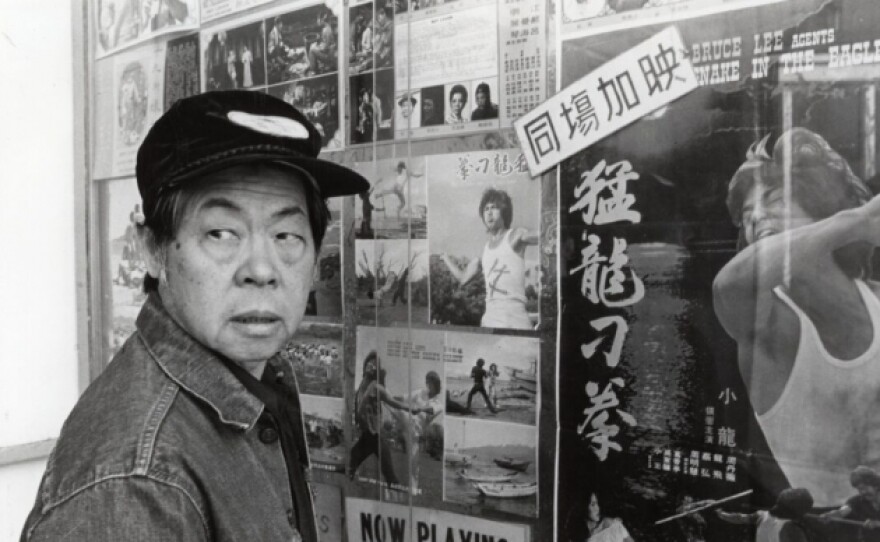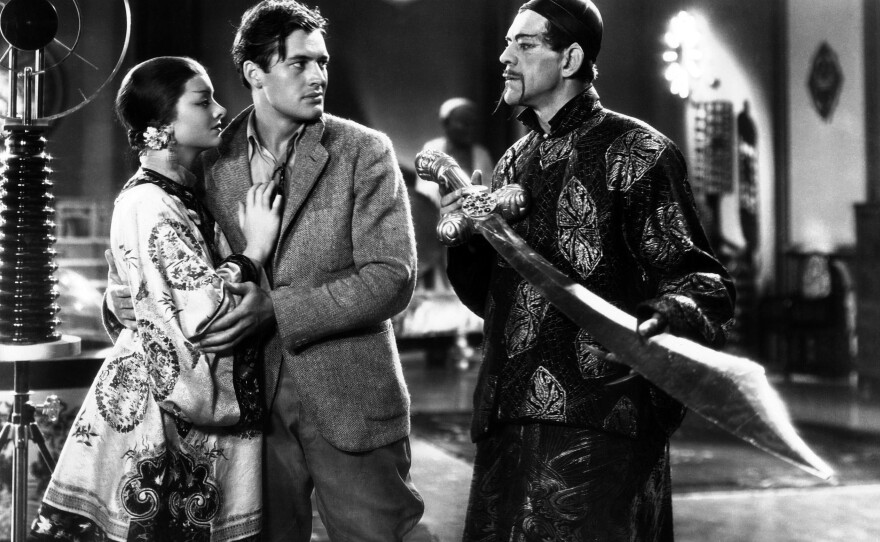A Few Alternate Images Of Asian-Americans
"Chan is Missing" (1982)
"Better Luck Tomorrow" (2002)
"Harold and Kumar" (2004)
"Colma: The Musical" (2006)
"In the Family" (2011)
"The Mask of Fu Manchu" screens as part of the Breaking the Commandments: Pre-Code Hollywood film series at Digital Gym Cinema. It stars Boris Karloff as the evil Asian title character and that raises issues of racial stereotypes that need to be considered in a broader context.
Earlier this year New Jersey lawmakers wanted schools to stop teaching Mark Twain's "Huckleberry Finn," YouTube recently pulled Leni Riefenstahl's "Triumph of the Will" for violating new hate speech policy, and George Clooney decided he needed to correct the misogyny of Joseph Heller's "Catch-22." for TV.
All these things point to the difficulty of dealing with film and literature from a past that was troubled by problematic and sometimes horrific stereotypes. But trying to erase such things or sanitizing them means we can't learn from them or see how far we have come or how far we still need to go.
As one of the programmers for Film Geeks SD and someone of Chinese descent I gave a lot of thought to whether or not to include "The Mask of Fu Manchu," which stars Karloff as the title character and Myrna Loy (who would personify the ideal wife just two years later in "The Thin Man") as his daughter. These are white actors playing Asian characters that are depicted as evil villains.
But the film is part of a series on pre-Code Hollywood and is important in considering the films of that era. It's visual style and production design are worthy of attention and seeing how the film fits in with Karloff's other work from the era in "Frankenstein" and "The Black Cat" also makes it noteworthy.
It is a film that channels the fear many Americans had of foreigners but it also reveals the fascination the public had with the exotic "Orient."
This film has a very different tone from the crass negative stereotype Mickey Rooney gave audiences in "Breakfast at Tiffany's" that was three decades later. The Chinese characters are used as stock villains but there are occasional moments that reveal something else as when Fu Manchu reveals he has received education at three prestigious universities or his outrage and threat of an Asian rebellion at the pompous British character. These mere hints of interest to more layers of the character are not enough to gloss over the negative racial stereotypes but they do reveal that in this film it is not the mere caricature that the film is after, which is what Rooney's performance was all about.

In deciding to show the film we knew we wanted it to be put into a context so that we could learn something and the person to do that is Brian Hu, artistic director of Pac-Arts' San Diego Asian Film Festival. For two decades the festival has worked to present an Asian and Asian American perspective through film.
Hu explained the social and political climate that the film was made in: "This is on the heels of the Chinese Exclusion Acts, which were enacted in the late 19th century as a result of fears that Chinese people were taking American jobs and as well as the fact that they were afraid that Chinese people were bringing some sort of kind of immorality — they were not Christians. They were in these seedy Chinatowns where we're not sure what's going on. They were afraid of the Chinese bringing women because they might be prostitutes. But these were laws that were enacted to try to keep the Chinese out. And so these films, which treated Chinese people as villains trying to take over the world, can fit within that ideology of wanting some to maintain a certain kind of racial purity in the United States. This is a period of time where there was prejudice against Asians. People were afraid of them on certain levels. But Hollywood films also reveal a certain fascination for them. And this kind of titillation about something exotic. So how does that play into this?"
The character of Fu Manchu appeared in many films for decades, but even in 1965 we still had a white actor, Christopher Lee, playing the character.
"It doesn't surprise me," Hu said. "In the 1930s, at a time when even in California there were anti-miscegenation laws by having white actors play the Chinese, it makes it for the audience a little bit more acceptable that Asians are mating with white people and having sex with them. So casting white people as Asians have had a long history of making Asians acceptable. And we see that throughout the 1950s and '60s and even to today you have cases of Scarlett Johansson making her eyes a certain way to play an Asian person 'Ghost in the Shell' or Emma Stone with 'Aloha.' So these things are still happening today so that it happened the 1960s and '70s it's not all surprising to me."
These films are problematic and potentially offensive yet they are also revealing of who we were and are.
"We should not ban these films," Hu said.
"These films reveal so much about how we think about America, how we were taught to maintain a certain kind of racial purity in America, which is so relevant today. These films are setting the stage for a lot of the ways we think about race today. There's so much we can learn from them," Hu said. "And yeah these are very exaggerated versions of fear of the other. But today we have more subtle versions that are still part of the same ideological desire for racial purity that we see in these films. So what's important to me is understanding that history knowing kind of the production context, knowing what it was in Hollywood that created these kinds of films so the context is most important. And then, of course, we should not just play these films anywhere. These films could play in a certain kind of context that would be incredibly destructive for America even today. There's some kind of white supremacist context where I would not want this film to be shown. So finding the right audience for them, an audience that is receptive to understanding that history. I think that's the best way for us to continue to remember these movies."

To counter the image of Asians in films such as "The Mask of Fu Manchu" and the "Charlie Chan" movies, Hu has some suggestions.
"Charlie Chan also created all kinds of stereotypes for Asian-Americans growing up in the 1960s and '70s," Hu said. "So I think it's especially cool that in the early 1980s there was a film called 'Chan is Missing,' directed by Wayne Wang who is inverting a lot of these stereotypes of Charlie Chan into a bizarre little comedy indie film set in San Francisco's Chinatown that is very much about giving voice to Asian Americans and Chinese Americans in this period. Something like that obviously is a nice corrective to to these Hollywood presentations but 'Chan is Missing' also is given this sort of status as inaugurating an Asian-American independent cinema that after that film Asian-Americans realize what we can tell our own stories too and that are miles away from the kinds of pitiful characters in 'The Good Earth' or these treacherous villains in the 'Fu Manchu' films."
"The Mask of Fu Manchu" screens as part of a horror/thriller pre-Code double bill with "The Most Dangerous Game" on July 7 at 1 p.m. at Digital Gym Cinema.







